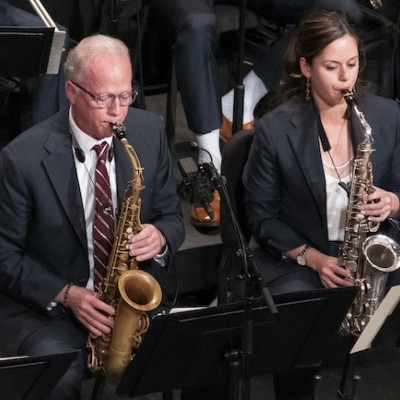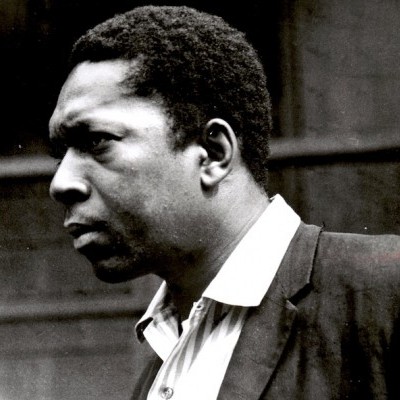Mar 4, 2025 1:29 PM
Changing of the Guard at Lincoln Center Jazz Orchestra
On October 23, Ted Nash – having toured the world playing alto, soprano and tenor saxophone, clarinet and bass…

Alto saxophonist Immanuel Wilkins’ debut album is titled Omega.
(Photo: Dana Scruggs)Immanuel Wilkins’ debut album, Omega (Blue Note), marks the emergence of a talented young instrumentalist, composer and bandleader with an instantly identifiable voice. It also makes a dramatic statement about issues associated with Black life in 20th- and 21st-century America. Recorded in January 2019 and produced by Jason Moran, Omega features the 23-year-old alto saxophonist’s working quartet with pianist Micah Thomas, bassist Daryl Johns and drummer Kweku Sumbry, a group dedicated to Wilkins’ vision of developing emotionally charged original music that speaks directly to the Black experience.
Take, for example, the album’s second track, “Ferguson–An American Tradition,” which conveys the intense emotions Wilkins felt as a teenager following the 2014 killing of Michael Brown Jr. by police in Ferguson, Missouri. “Growing up, my parents were always adamant in reminding me of my color, reminding me of the social situation that was going on in the world, so I always had an acute awareness,” he said during a phone call from his hometown of Philadelphia. “But Ferguson hit me specifically because Michael Brown and I were close in age. And I realized that it could happen to anybody.”
The piece deals with events in a reverse narrative, starting with the aftermath of Brown’s killing, then working its way back to the initial experience. It’s an intense ride. “A lot of what we were trying to capture was an idea of cacophony, of chaos,” said Wilkins, who noted that the 7-minute track also plays to his personal fascination with the meeting of jarring and wondrous imagery in art and culture. “I’ve been obsessed with social media, TikTok, Twitter, Black Twitter, Black TikTok, and how there’s always this kind of sublime, grotesque juxtaposition in ways that are beautiful, in ways that are hilarious, in ways that are nostalgic. I’m obsessed with those type of aesthetics.”
A companion piece titled “Mary Turner–An American Tradition” tells the shockingly tragic but seldom-told story of a 1918 lynching that took place in Georgia. “I had done some research after learning about the Michael Brown situation on the history of America in terms of killing Black people,” Wilkins said. “And the story of Mary Turner was one of the more horrific things that I had found. When I was writing that piece I was thinking about, how do you paint a picture of that terror she must have felt?”
Omega also celebrates the Black experience in solemn and jubilant ways. The uplifting leadoff track, “Warriors,” exalts family, friendship, faith and community. “The Dreamer” delivers a tranquil reflection on influential Black activist and author Weldon Johnson. And a four-part suite of pieces informed by Wilkins’ experience as a church musician and student of Bach celebrates the long arc of a romantic love affair.
Since moving to New York in 2015 to attend Juilliard, Wilkins has earned a sterling reputation as a versatile sideman who’s capable of just about everything. He’s worked for high-profile leaders like Moran, Wynton Marsalis, Aaron Parks and Solange Knowles, to name a few.
“I always had this mentality of, ‘Why not do it all?’” Wilkins said. “My musical mission is to blend traditions. It’s not about removing things from the music; it’s more like stacking things on top of each other. If you’re stacking cardboard boxes, once you get to a certain number of boxes, they start to crush each other. And that’s not what we want to do in the music. It’s not about forsaking things. The real trick, and what makes playing this music so hard, is that we’ve got to make sure these boxes stay intact. So, it’s actually about building on the tradition.” DB
This story originally was published in the December 2020 issue of DownBeat. Subscribe here.

As Ted Nash, left, departs the alto saxophone chair for LCJO, Alexa Tarantino steps in as the band’s first female full-time member.
Mar 4, 2025 1:29 PM
On October 23, Ted Nash – having toured the world playing alto, soprano and tenor saxophone, clarinet and bass…

“This is one of the great gifts that Coltrane gave us — he gave us a key to the cosmos in this recording,” says John McLaughlin.
Mar 18, 2025 3:00 PM
In his original liner notes to A Love Supreme, John Coltrane wrote: “Yes, it is true — ‘seek and ye shall…

The Blue Note Jazz Festival New York kicks off May 27 with a James Moody 100th Birthday Celebration at Sony Hall.
Apr 8, 2025 1:23 PM
Blue Note Entertainment Group has unveiled the lineup for the 14th annual Blue Note Jazz Festival New York, featuring…

“I’m certainly influenced by Geri Allen,” said Iverson, during a live Blindfold Test at the 31st Umbria Jazz Winter festival.
Apr 15, 2025 11:44 AM
Between last Christmas and New Year’s Eve, Ethan Iverson performed as part of the 31st Umbria Jazz Winter festival in…

“At the end of the day, once you’ve run out of differences, we’re left with similarities,” Collier says. “Cultural differences are mitigated through 12 notes.”
Apr 15, 2025 11:55 AM
DownBeat has a long association with the Midwest Clinic International Band and Orchestra Conference, the premiere…